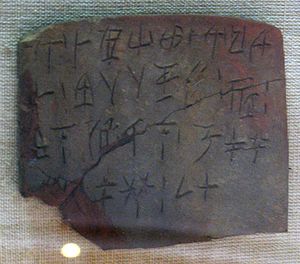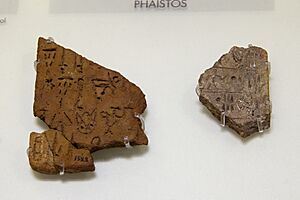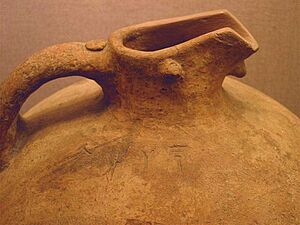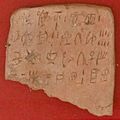Linear A facts for kids
Quick facts for kids Linear A |
|
|---|---|
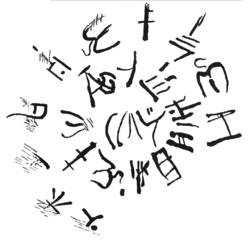
Linear A inscription on a cup
|
|
| Type | Undeciphered presumed logosyllabic (syllabic and ideographic) |
| Spoken languages | 'Minoan' (unknown) |
| Time period | MM IB to LM IIIA 1800–1450 BC |
| Status | Extinct |
| Child systems | Linear B, Cypro-Minoan syllabary |
| Sister systems | Cretan hieroglyphs |
| Unicode range | |
| ISO 15924 | Lina |
| Note: This page may contain IPA phonetic symbols in Unicode. | |
| This article contains Linear A Unicode characters. Without the correct software, you may see question marks, boxes, or other symbols instead of Linear A. |
Linear A is a mysterious writing system used by the ancient Minoans on the island of Crete. They wrote with it from about 1800 BC to 1450 BC, using it for records in their palaces and for religious writings.
Linear A is the parent of another script called Linear B, which was used by the Mycenaeans to write an early form of Greek. The archaeologist Sir Arthur Evans discovered Linear A in 1900. He called it "Linear" because the characters were made of simple lines drawn on clay. Even today, no one has been able to fully decipher it, making it one of the great puzzles of ancient history.
Contents
What is Linear A?
Linear A is a type of writing that uses a mix of signs. Some signs stood for syllables (like pa, te, or ro), while others were like little pictures that stood for whole words or ideas (like 'man' or 'sheep'). This is called a logosyllabic system.
Sometimes, the writers would combine signs to create new, more complex signs.
In total, there are over 300 known Linear A signs, but only about 90 were used regularly. Some signs were pictures, called ideograms. We know what some of these mean because they are similar to signs in Linear B. For example, there were ideograms for people, animals like sheep and goats, and products like wheat, olives, figs, and wine.
Linear A was usually written from left to right, just like English. However, a few documents have been found that were written from right to left.
Counting in Linear A
The Minoans had a simple system for writing numbers. It was based on ten, just like our system today. Vertical lines were for ones, horizontal lines for tens, circles for hundreds, and circles with thousands for rays. They even had special signs for fractions!
| 1 | 2 | 3 | 4 | 5 | 6 | 7 | 8 | 9 |
| 10 | 20 | 30 | 40 | 50 | 60 | 70 | 80 | 90 |
| 100 | 200 | 300 | 400 | 500 | 600 | 700 | 800 | 900 |
Fractions
Figuring out the fractions has been tricky for scientists, but they have some good guesses. They believe special signs, called klasmatograms, stood for fractions like 1/2, 1/4, and 1/5. They could also combine these symbols to make other fractions, like 3/4.
| Symbol | Glyph | Value |
|---|---|---|
| J | 1⁄2 | |
| E | 1⁄4 | |
| B | 1⁄5 | |
| D | 1⁄6 | |
| F | 1⁄8 | |
| K | 1⁄10 |
Where Has Linear A Been Found?
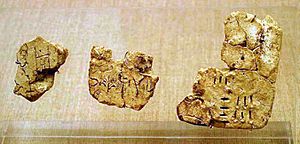
Archaeologists have found Linear A in many places, mostly on the island of Crete. But it has also appeared on other Greek islands, and even in modern-day Turkey and Israel. In total, we have about 1,400 examples of Linear A writing, but many are just small fragments.
The writing is found on different kinds of objects. The most common are small clay tablets, which were probably used for keeping lists of goods, like an inventory. It was also written on clay seals used to mark property, and on special stone tables that might have been used for religious ceremonies at holy sites. Sometimes, short messages are found scratched onto pottery or jewelry, like a silver hairpin.
A Timeline of Ancient Writing
Linear A was one of several writing systems used in the ancient Aegean world. It grew out of an earlier script called Cretan hieroglyphs, which looked more like pictures. Later, Linear A was adapted to create Linear B for writing the Greek language. This table shows how the scripts overlap.
| Writing system | Geographical area | Time span |
|---|---|---|
| Cretan Hieroglyphic | Crete, Samothrace | c. 2100–1700 BC |
| Linear A | Crete, Aegean islands (Kea, Kythera, Melos, Thera), and Greek mainland (Laconia) | c. 1800–1450 BC |
| Cypro-Minoan | Cyprus and trading partners, Ugarit | c. 1550–1050 BC |
| Linear B | Crete (Knossos), and mainland (Pylos, Mycenae, Thebes, Tiryns) | c. 1450–1200 BC |
The Great Mystery: Why Can't We Read It?
Even though we've known about Linear A for over a century, it remains a mystery. So why is it so hard to crack this ancient code?
First, there aren't many examples to study. We have thousands of texts in Linear B, but only about 1,400 for Linear A, and most are very short lists. It's like trying to learn a language from just a few shopping lists.
Second, we haven't found a "Rosetta Stone" for Linear A. The Rosetta Stone helped us understand Egyptian hieroglyphs because it had the same text in three different languages, one of which we already knew. We don't have a bilingual text like that for Linear A.
Finally, the biggest challenge is that we don't know what language it represents. This unknown language is often called Minoan. Since it doesn't seem to be related to any other known ancient language, it's very difficult to understand the words.
Making Educated Guesses
Despite the challenges, researchers have made some progress. They can make good guesses about the sounds of many signs by comparing them to Linear B.
The idea is simple: if a sign in Linear A looks the same as a sign in Linear B, it probably made a similar sound. Using this method, scientists can "read" Linear A words, but the words they get don't belong to any known language.
For example, one word in Linear A is read as Pa-i-to. This is almost the same as the name for the ancient city of Phaistos found in Linear B texts. This match gives scientists confidence that they are on the right track with the sounds.
The Lost Language of the Minoans
So what was the Minoan language like? Based on the writing, it seems to have used many prefixes and suffixes to change the meaning of words. It also seems to have had a simple vowel system with sounds like 'a', 'e', 'i', and 'u'.
Some scholars have noticed similarities to ancient languages from Anatolia (modern Turkey) or even Semitic languages like Phoenician. However, these are just theories. For now, the language of the Minoans remains lost to time, waiting for a future discovery to unlock its secrets.
Images for kids
See also
 In Spanish: Lineal A para niños
In Spanish: Lineal A para niños
 | Georgia Louise Harris Brown |
 | Julian Abele |
 | Norma Merrick Sklarek |
 | William Sidney Pittman |





